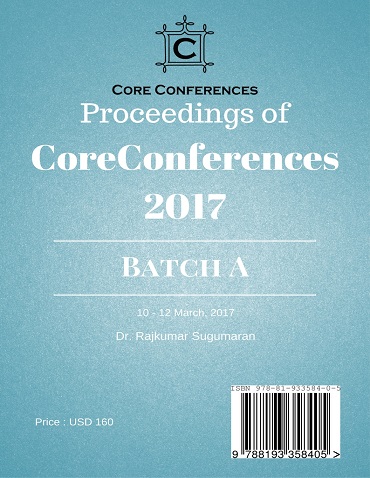- Publication Meta:Value
- Short Title:CC Batch A 2017
- Publisher:ASDF, India
- ISBN 13:978-81-933584-0-5
- ISBN 10:81-933584-0-6
- Language:English
- Type:Hard Bound - Printed Book
- Copyrights:CC Batch A Organizers/ DCRC, London, UK
- Editor-in-Chief:Dr A Senthilkumar
- Conference Dates:10 - 12, March 2017
- Venue Country:Crowne Plaza Changi Airport, Singapore
- Submitted Papers:589
- Acceptance Rate:8.12%
- Website:www.coreconferences.com
Welcome to ASDF Electronic Digital Library!
CoreConferences 2017
CoreConferences 2017
International Conference on Architecture and Civil Engineering 2017
Paper 024
The Green Campus Strategies of Aalto University in Finland through Abroad Field Survey
Yoon Jung Choi1, SeungMok Lee2, DaSeul Lee3,DoGyeong Kim4
1,2,3,4Department of Housing & Interior Design, Chungbuk National University, South Korea
Abstract
The purposes of this study are to report the strategies of an advanced green campus example and to list up their categories and elements as the fundamental materials for further researches and promotion of green campuses in Korea. For the research, we selected Aalto University which is one of the leading figures with sustainable approach and a founding member of Nordic Sustainable Campus Network (NSCN). We conducted a literature review and a field survey including research meeting and field trip with the energy efficiency team of Aalto University, and field investigation. The abroad research trip was fulfilled from August 17 to 26, 2016. In Aalto University, social responsibility and sustainability are the fundamental values and strategies of all activities. The most distinctive effort for green campus in Aalto is 'ECOCAMPUS 2030 project' which makes the university itself as the energy self-sufficient campus by 2030. The university will use only renewable energy produced by photovoltaic, solar heat, small scale wind power, geothermal heat & cooling, heat pump, and small scale CHP through the progress with 'reduction of potential for consumption', 'evaluating production potentials', and 'roadmap to a comprehensive regional energy solution'. Also, diversified sustainable approaches such as the campus wide master planning and the facilities renovations have been carried out for reduction of CO2 emission and promotion of healthy environment. As a result, the green campus strategies of Aalto University are operated in 12 multilateral categories: administration, networking, education, researches, energy, campus wide planning, transportation, buildings, procurement, waste & recycling, food & health, and practice & events.
Keywords
Author's Profile
Author profile can be generated and linked through our partners World Book of Researchers. To include your profile online Click Here. After it is approved, please email to edlib @ asdf.res.in to create a link with all the papers.
e-AID
CoreConferences.2017.024
Cite this Article as Follows
Yoon Jung Choi, SeungMok Lee, DaSeul Lee, DoGyeong Kim. The Green Campus Strategies of Aalto University in Finland through Abroad Field Survey. International Conference on Architecture and Civil Engineering (2017): 12. Print.
© 2010 - by EDLIB .
All Rights Reserved.

